African Cultural Alliance of North America (ACANA) is a non-profit social services agency and community development corporation located in Southwest Philadelphia that serves as a resource and bridge to the African immigrant and African American community in Southwest Philadelphia. With key funding from M&T Bank, ACANA purchased a trash truck to further enhance the City’s corridor cleaning and trash removal efforts.
Tell us about the origins of ACANA and the role it plays for the Southwest Philadelphia community.
ACANA was founded in 1999 as a 501(c)(3) nonprofit organization in Philadelphia by a group of African musicians who sought to establish themselves in the United States. The mission is to help refugees, immigrant families, and all residents of Philadelphia access legal, health, and other social services with a special focus on women, children, youth, and the elderly in their resettlement process in Pennsylvania. ACANA also produces and presents African cultural performances and recording artists to create an awareness of African arts and culture. The agency strives to promote the preservation of cultural values through musical artists to promote their own vocations in their new environment.
In 2015, ACANA added the Community Development Corporation (CDC) with the goal to help small business development and community revitalization projects in Southwest Philadelphia. The ACANA CDC is a culturally diverse neighborhood effort geared toward the creation of a vibrant business community prepared and ready to utilize City, State, and other resources to help improve the quality of life in the neighborhood through small and medium skill enterprise development. The organization’s focus is to preserve Southwest Philadelphia communities and to improve the quality of life through the creation of employment and entrepreneurial opportunities for very low and moderate-income business owners and individuals. The agency’s effort is complementary to the Philadelphia Department of Commerce’s support for small and medium business growth through the Philadelphia Targeted Commercial Corridor Revitalization Management Program (TCMP). The goal is to create a holistic business Corridor that is encompassing cultures co-existing to improve the quality of life, expanding opportunities that promote social and economic growth to uplift people and the community.
How did the idea for ACANA to own and operate a trash truck of its own come to be?
The idea for ACANA to own and operate its trash truck came about in 2019 when ACANA CDC and M&T Bank, located on Woodland Avenue, organized a partnership to launch a cleaning campaign in Southwest Philadelphia to help remove litter and to help pick up trash from the commercial corridors including certain streets located in Southwest Philadelphia. It was during that partnership’s cleaning activities that we noticed a lot of short-dumping of household trash on the commercial corridor including some heavy trash on certain streets. We observed dumped mattresses and other types of furniture being dumped everywhere in the Southwest Philadelphia neighborhood and on the main commercial corridors. As the Commercial Corridor Administrator for ACANA CDC I thought it would be beneficial to engage Preston Stackfield, the branch manager at M&T Bank located on the 63rd Woodland Avenue Corridor, to talk about possible assistance to further enhance the ACANA CDC cleaning efforts, which is geared toward reducing trash and removing debris from the neighborhood including the commercial corridors of Woodland Avenue, Chester Avenue, Elmwood Avenue, and Baltimore Avenue.
Through the partnership, Preston and I opened up to each other and begin to communicate more frequently about making an impact in Southwest Philadelphia. A few months later, the COVID-19 Pandemic engulfed and things were pulsed. In March of 2020, I reached out to Preston again to see if we could reconnect to discuss assistance for small business owners on corridors since most of the businesses were affected by the pandemic. He asked me to set up a Zoom meeting for us to talk and wanted to bring the conversation to senior staffers at the bank to talk about assistance for business owners and the community in general. During that virtual conference, we talked about many things including small business grants and micro-loan opportunities, cognizant of how the pandemic affected many of the small businesses in Southwest. The conversation went further and a question was asked about how M&T Bank can help with cleaning and trash removal on the corridors and within the community. It was then the ACANA Team decided to schedule another meeting to come up with an answer regarding what kind of help ACANA will need from the bank to further enhance ACANA’s cleaning effort.
The ACANA Team retreated to organize a meeting with the Woodland Business Association, including residents and stakeholders. During that meeting, most people talked about trash, short dumping, and heavy household trash being dumped on the corridor. The information we gathered from meeting with the Woodland Business Association members, residents, and stakeholders, inspired the ACANA Team to ask M&T Bank to help ACANA secure a compact truck through grant funding to be used to further enhance the City of Philadelphia Department of Commerce TCB-Corridor Cleaning and trash removal efforts in Southwest Philadelphia, serving the 2nd and 3rd Councilmatic Districts. It was within that good spirit that the M&T Bank branch, located on Woodland Avenue, awarded ACANA $40,000 in grant funding to purchase a compact trash truck. This is how ACANA came to own and operate the truck.
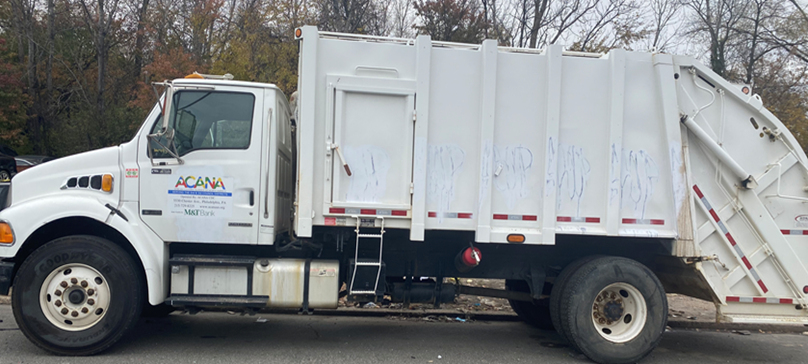
How long did it take to make this idea a reality? What was the process like to secure funding for the trash truck?
The process of making the idea a reality took about two and half years to secure the truck and process the necessary documentation, which included completing Form MCS-150 to secure a USDOT# and to apply for the Commonwealth of Pennsylvania Waste Transportation Safety Program Written Authorization Permit.
The process involved building partnerships with financial institutions such as banks that are located on the commercial corridor. First, we engaged the bank through the branch manager and talked about various beautification strategies and possible assistance for the community and for commercial corridor beautification. Then, we explained to the branch manager how beautifying the corridor could increase shopper foot traffic to shop on the corridor and serve to invite more visitors to the commercial corridor for shopping and banking. We constantly engaged the branch manager of the bank and made sure he or she understands the value that a clean environment could lead to a welcoming and inviting place to attract new businesses in the neighborhood, which can also lead to more people opening new accounts at the bank.
As a corridor manager, you also want to encourage the small business owners operating on the commercial corridor to consider opening accounts at the banks that are operating on the commercial corridor, and facilitate partnership between the bank and business owners through referrals, loan opportunities and grant opportunities. Through our engagement and partnership with M&T Bank, the bank was able to fund small businesses in Southwest Philadelphia Community with grant money in the amount of $250,000. Most small business owners received between $5,000 and $15,000 that they could use to comply with COVID-19 safety guidelines, hire residents of the community, cover operating costs or pay for façade improvement for their storefronts.
What advice would you give to others who are trying to champion corridor cleaning and trash removal in their neighborhood?
My advice to other corridor managers or administrators is to find a better way to establish mutual partnerships between small and medium-sized businesses and financial institutions like the banks [RS1] and the credit unions that are doing business on the corridor. These partnerships can lead to shared benefits for small businesses, community residents, financial institutions, like the banks, and the contracting Community Development Corporation (CDC) that’s managing the commercial corridor. Part of our objective here at ACANA CDC is for the business community, the residents of Southwest Philadelphia, and the stakeholders to value our work as impactful to the community. We want to be seen as problem solvers and a resource hub for the entire community. To champion corridor cleaning and trash removal in the neighborhood, CDCs management teams are to collaborate with other community organizations during work within the neighborhood and organize community meetings.
During these meetings, engage the residents, the business owners, stakeholders, and other attendees. Ask questions about what the community residents want to see on the commercial corridors and within the neighborhood, write down the responses you get from the audience, try to incorporate the feedback and concerns that folks raised at the meetings into your work plan. Do more listening than talking, connect with folks and ask for their emails and telephone contacts so that you remain in touch with them after the meeting. For us here at ACANA, we listened to community residents, the business community, and stakeholders. The overriding issue we heard from the community was the issue of trash all over the commercial corridors and we considered that concern to be very serious. In order for us to reduce the trash on the corridor, we had to employ more cleaning ambassadors to work 6 days a week and utilize ACANA CDC Trash Truck to collect the trash and dump it at the designated trash depot. To achieve these objectives, partnership and collaboration are the key.
What’s next for ACANA?
There are several next things in the pipeline for ACANA CDC. ACANA is working on a possible storefront improvement project in partnership with the Philadelphia Housing Authority (PHA), and the Philadelphia Department of Commerce. This project will benefit small businesses on Woodland and Chester Avenues to improve their storefronts with new awnings and see-through gates. Second, ACANA is also working with Diversified/BFW Group LLC, Company on the James Finnegan Playground Project in Southwest Philadelphia. The Diversified/BFW is contracted by Philadelphia Rebuild Project to redevelop the James Finnegan Playground in Southwest Philadelphia, located at 6801 Grovers Avenue. In this partnership, ACANA is contracted by the Diversified/BFW Group LLC to do community outreach and engagement for the project. Third, ACANA is also working toward the construction of the Africa Center on between the 5500 and 5400 blocks of Chester Avenue. This center will serve as a resource hub to host several projects including, business and community development services, healthcare services, a restaurant, and a banquet hall. The center when completed will transform Chester Avenue and create more attraction for the area. In addition to the trash truck, ACANA also managed and completed the below storefront improvement project on Chester as part of the agency’s Targeted Corridor Management Program (TCMP).
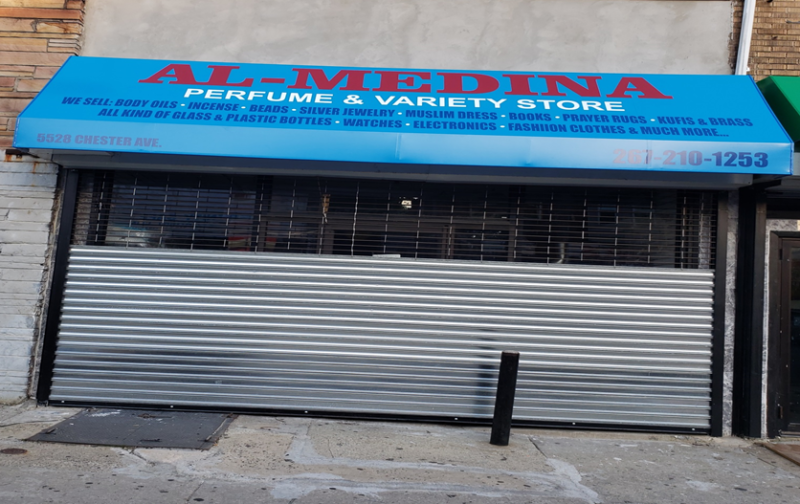
5528 Chester Avenue 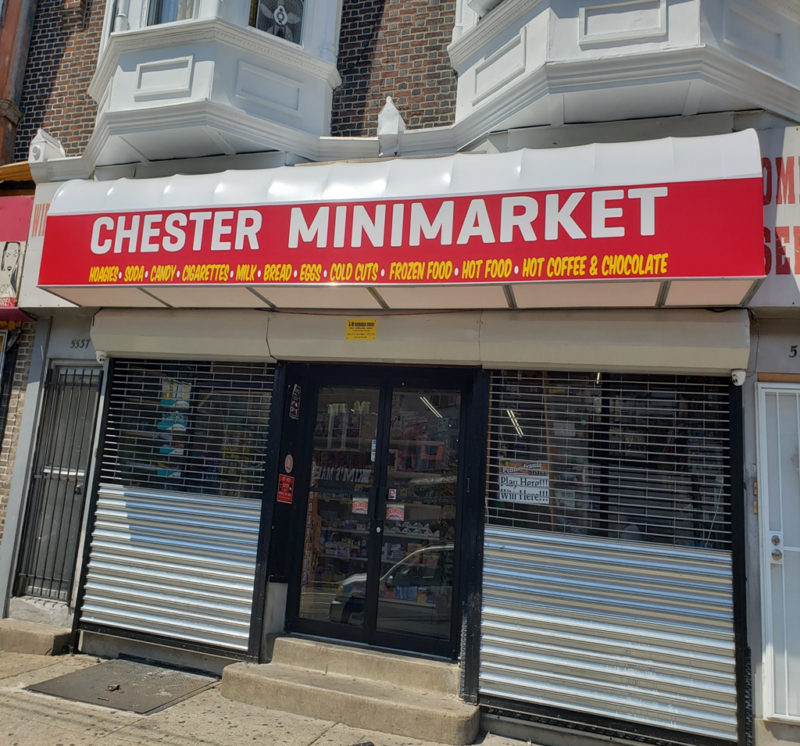
5535 Chester Avenue 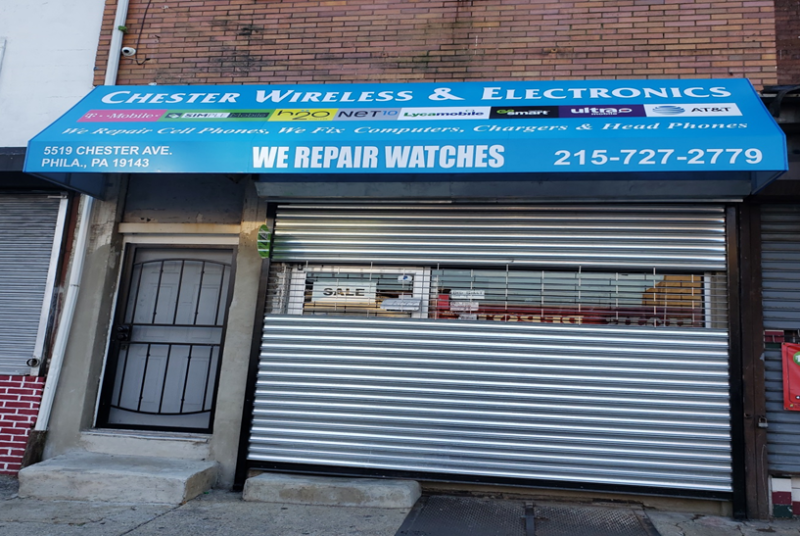
5519 Chester Avenue 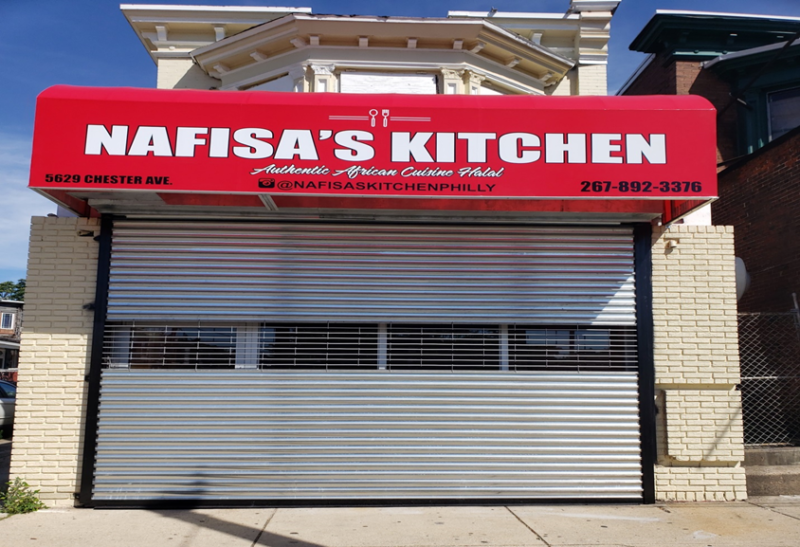
5629 Chester Avenue